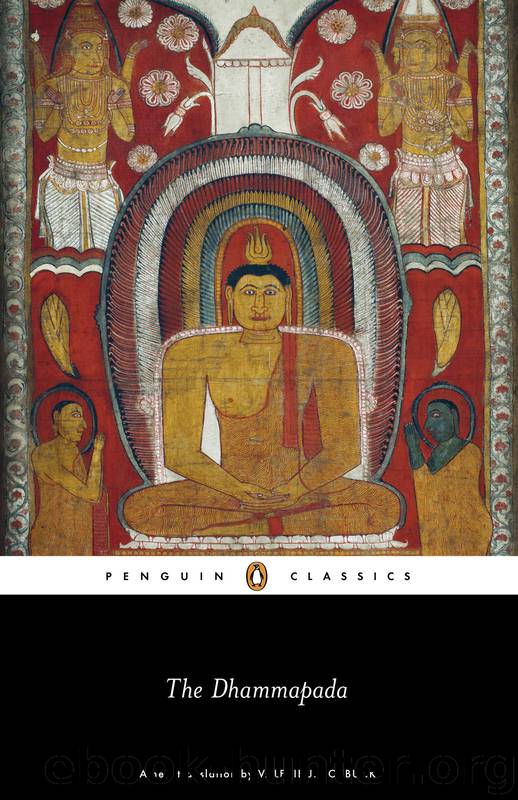The Dhammapada by Valerie Roebuck

Author:Valerie Roebuck
Language: eng
Format: epub
ISBN: 9780141963556
Publisher: Penguin Books Ltd
Published: 2010-08-06T16:00:00+00:00
CHAPTER 2
AWARENESS
The Pali word translated here as ‘awareness’ is appamāda, the opposite of pamāda, ‘intoxication’, ‘carelessness’, ‘unawareness’. As often in Pali, the negative suffix has a stronger force than in English, and appamāda is one of the most important qualities for a Buddhist to develop: that of constant mindfulness. The pair form one of the most important oppositions in Buddhist literature. Other commonly found translations are ‘heedfulness’ and ‘heedlessness’ and ‘diligence’ and ‘negligence’. In v. 309, I have translated the related adjective pamatta as ‘reckless’.
21–3. peace of yoga: yoga-kkhema – a compound word that seems to change its meaning over the course of Pali literature (and Sanskrit literature, where it appears as yogakṣema). Sometimes it is taken as a dvandva compound, ‘yoga and khema’ (e.g. ‘getting and enjoyment’), and sometimes as a tatpuruṣa, with various possible relationships between the two: ‘the khema of yoga’, ‘the khema from yoga’ etc. Unfortunately, both the individual words vary greatly in their meanings. I have taken it as the peace (khema) reached through practice (yoga). K. R. Norman (1997: 4, 67) takes it as ‘rest from exertion’; Carter and Palihawadana (1987: 112) as ‘freedom from bonds’.
STORY: A cycle of stories concerns the adventures of King Udena (or Udayana) and his wives Vāsuladattā, the chief queen, Sāmāvatī, the daughter of a banker (seṭṭhi – see Glossary), and Māgandiyā, a Brahmin woman. Sāmāvatī and her maids are devoted followers of the Buddha, having heard his teaching reported by a hunchbacked slave woman called Khujjuttarā, who first hears him teach when sent out to buy flowers for the queen, and attains Stream-Entry. Sāmāvatī notices a change in Khujjuttarā when she starts to bring twice as many flowers back as before. Previously, it appears, she used to keep half the flower money for herself, but now she spends it all on flowers. Far from being angry, Sāmāvatī continues to send Khujjuttarā to hear the Buddha’s teaching and to report to them what she has heard. (Khujjuttarā becomes the laywoman most skilled in teaching the Dhamma.)
Māgandiyā, in contrast, hates the Buddha, because he rejected her when her father offered her to him in marriage – see the story for vv. 179–80. She tries to stir up the mob against him (see the story for vv. 320–22). She also tries to poison the king’s mind against Sāmāvatī, making it appear that she is plotting against him. This fails, and indeed the king joins Sāmāvatī in taking refuge in the Buddha.
Finally, Māgandiyā has Sāmāvatī and her maids burned to death in their house. At the point of death, all of them meditate on loving kindness, and are reborn in higher states. When the king finds out the truth about what has happened, he has Māgandiyā and her accomplices put to death.
The Buddha speaks the verses as a comment on the contrasting fates of Sāmāvatī and Māgandiyā.
24. STORY: In a time of plague, a layman called Kumbhaghosaka leaves his native city and lives as a hired hand, despite having a secret store of treasure.
Download
This site does not store any files on its server. We only index and link to content provided by other sites. Please contact the content providers to delete copyright contents if any and email us, we'll remove relevant links or contents immediately.
| Bhagavad Gita | Upanishads |
| Vedas |
Fingersmith by Sarah Waters(2005)
Kundalini by Gopi Krishna(1821)
The Bhagavad Gita by Bibek Debroy(1665)
Indian Mythology by Devdutt Pattanaik(1619)
Wheels of Life by Anodea Judith(1603)
The Yoga of Jesus: Understanding the Hidden Teachings of the Gospels by Paramahansa Yogananda(1522)
The Man from the Egg by Sudha Murty(1499)
Autobiography of a Yogi (Complete Edition) by Yogananda Paramahansa(1485)
Chakra Mantra Magick by Kadmon Baal(1382)
The Book of Secrets: 112 Meditations to Discover the Mystery Within by Osho(1349)
Avatar of Night by Tal Brooke(1256)
The Sparsholt Affair by Alan Hollinghurst(1242)
Sparks of Divinity by B. K. S. Iyengar(1226)
Karma-Yoga and Bhakti-Yoga by Swami Vivekananda(1217)
The Bhagavad Gita (Classics of Indian Spirituality) by Eknath Easwaran(1205)
Gandhi by Ramachandra Guha(1191)
The Spiritual Teaching of Ramana Maharshi by Ramana Maharshi(1170)
Skanda Purana (Great Epics of India: Puranas Book 13) by Bibek Debroy & Dipavali Debroy(1137)
Hinduism: A Very Short Introduction (Very Short Introductions) by Knott Kim(1115)
